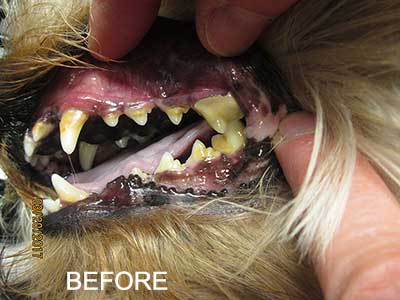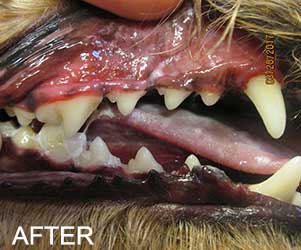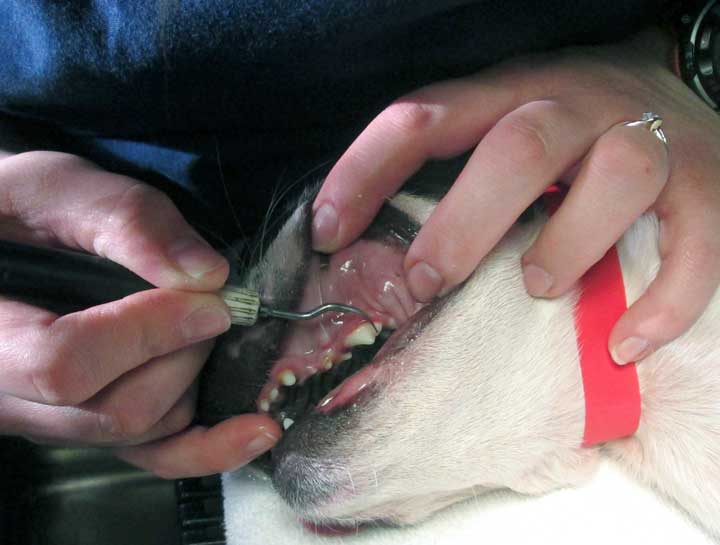Preventive Dental Care
Routine dental care matters.
Did you know- 85% of dogs aged 3 and over have already developed dental disease!! Your pet can't brush or floss its teeth so it's your job as its owner to help them maintain a healthy mouth!
Signs your pet may have dental disease:
- Bad breath
- Loose, discolored teeth covered with tartar
- Doesn't like their mouth touched
- Drooling or dropping food
- Bleeding from the mouth
- Decreased appetite and weight loss
Plaque contains bacteria that contribute to bad breath. Over time it solidifies into a rock-like material called tartar. Large volumes of bacteria in tartar and plaque in your pet's mouth can cause or contribute to many problems including:
- Pain
- Sinus infections, sinus pain, or congestion
- Abscess or infection on the face
- Liver disease
- Heart disease
- Kidney disease
Prevention is key to helping your pet live a long and happy life!!


Good dental health begins with the proper diet
The wrong kinds of food can cause dental distress in pets. Feeding your dog a dry food rather than a moist, canned one will, through its mild abrasive action on the teeth, help remove the bacterial plaque that can harden into tartar. Dry food also provides adequate chewing exercise and gum stimulation. Avoid giving your pet sweets and table scraps as they may also increase plaque and tartar formation. Your veterinarian may recommend the use of special dry foods designed to reduce plaque and tartar buildup, especially if your pet is prone to dental problems due to his breed or individual genetic history.
Brushing teeth can prevent plaque buildup from turning into tartar
Brushing your pet's teeth is the best way to get rid of plaque before it turns into tartar. When dental disease is mild most pets quickly learn to enjoy tooth brushing. Follow these tips to make it as pleasant as possible for both you and your pet:
- Only use non-fluoride toothpaste- pet-friendly flavors are best and can be purchased at most pet supply stores
- Use soft-bristled toothbrushes and focus on brushing the outside of the teeth- that is where most tartar develops!
- Reward your pet with praise and petting during the process and give him a very special treat for a job well done
Once tartar has formed professional dental cleaning is needed to get rid of the buildup
Pets with moderate to severe dental disease need to be anesthetized for their cleaning as the procedure takes longer and if the teeth are unhealthy from chronic disease they may need to be extracted. Once your pet is anesthetized we clean all the teeth and evaluate each tooth looking for signs of disease. We take x-rays of the teeth to look at the roots and make sure there are no problems under the gum line. After cleaning the teeth they are polished, and fluoride is applied to help protect the teeth from future damage.
What is a moderate sedation dental?
Pets with mild dental tartar can benefit from a dental cleaning too! When there is a small amount of tartar buildup we can perform a dental cleaning and polishing with sedation alone. With sedation your pet is calmer, allowing us to clean teeth safely without fully anesthetizing your pet. They recover from sedation quickly and have a shorter stay in the clinic.
Are you interested in having your pet's teeth cleaned and want to learn more about how we do that? The video Lucky's Dilemma takes you through a typical dental procedure with Lucky- a Sheltie with dental disease. To watch the video you can click here or find it under our resources link.
We would be happy to help your pet maintain a healthy smile!
Call us at (765) 642-8117 to schedule your pet’s oral health assessment or dental cleaning.

